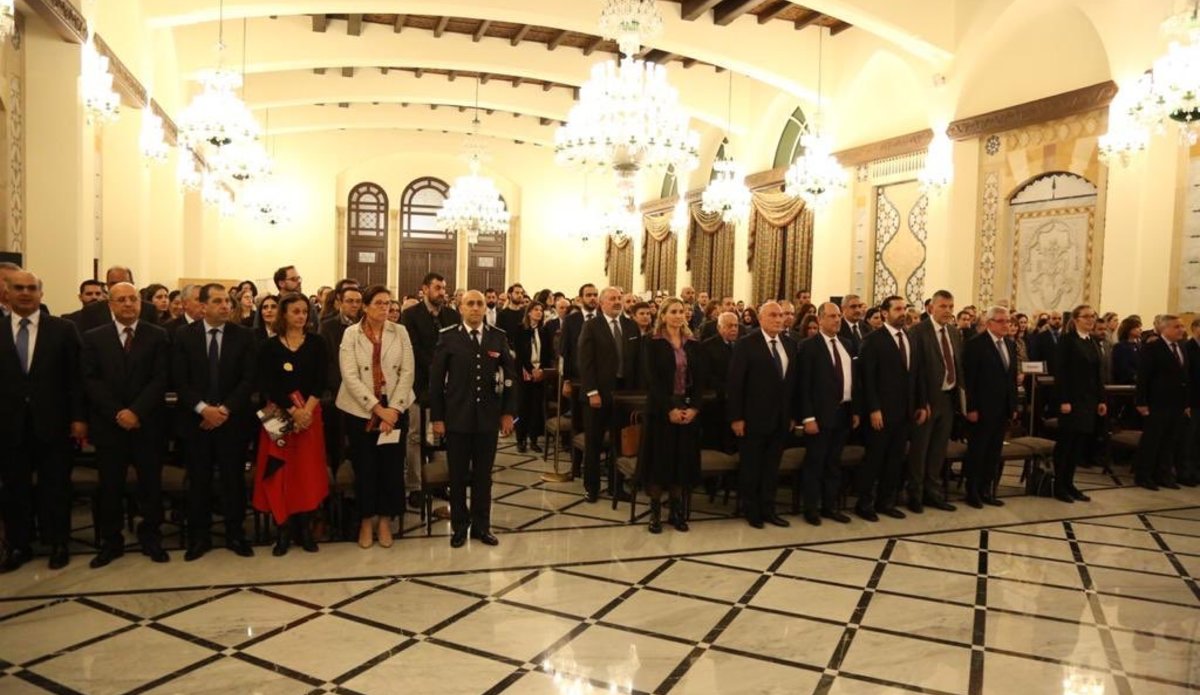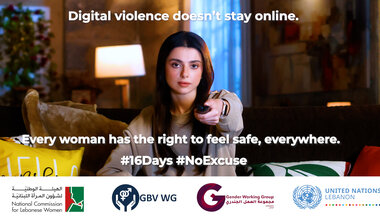The United Nations and Lebanon Appeal for $2.62 Bln for Lebanon Crisis Response Plan
Lebanon's Prime Minister-designate Saad Hariri, together with UN Resident and Humanitarian Coordinator Philippe Lazzarini and caretaker Minister of Social Affairs Pierre Bou Assi, launched the 2019 update of the Lebanon Crisis Response Plan (2017-2020) at the Grand Serail in Beirut.
As the Syria crisis enters its ninth year, the Government of Lebanon and its national and international partners today appealed for US$ 2.62 billion to deliver critical humanitarian assistance and invest in Lebanon’s public infrastructure, services and local economy amid deepening vulnerabilities. The crisis response plan brings together more than 133 specialized partners to assist 3.2 million people in need living in Lebanon. It aims at supporting 1.5 million vulnerable Lebanese, 1.5 million Syrian refugees, and more than 208,000 Palestinian refugees.
Launch of the Lebanon Crisis Response Plan 2019
Remarks by the UNRC/HC for Lebanon – Mr. Philippe Lazzarini
31 January 2019
Your Excellency, Prime Minister Hariri Minister of Social Affairs Pierre Bou Assi Minister Merhebi,
Ministers, Excellencies, Ladies and Gentlemen, Colleagues and Friends,
Today’s launch is the fourth since I took up my position as Humanitarian Coordinator. And therefore, I will come to you with four main messages.
First, the UN acknowledges the extraordinary hospitality and resilience of the Lebanese people as the Syria crisis enters its ninth year – you are an example to the world. At the same time, let me also underline that we share your concerns and believe the future of Syrian refugees is in Syria because this is also what the refugees are telling us.
Second: the Lebanon Crisis Response Plan is and has been the cornerstone of the response for both Syrians and Lebanese.
Third: More than ever, we need your support to implement the 2019 Response Plan. We cannot afford donor fatigue which in turn would fuel host community fatigue. This Plan is our best way to support refugees and vulnerable Lebanese communities alike.
Fourth: To increase the impact of our response, we must invest more in women.
Excellencies,
On refugee returns, I want to start by addressing some of the misperceptions circulated in the media. The UN and partners neither prevent nor discourage refugees to return when decisions are free and informed.
Refugees have the right to return. It is an individual decision and we respect that. We support families who wish to return by helping them to obtain the key documents that they need to cross the border and re- establish their lives in Syria.
But let us make no mistake: the main challenges to large-scale returns are not in Lebanon, but on the ground in Syria.
The challenges to return range from continued insecurity in some areas, to military conscription, uncertainty around the application of amnesty laws and property rights.
Yesterday, a young Palestine refugee from Syria told me: “I want to return, but I fear the unknown”. I think this is very telling for how many Syrian refugees are feeling. Despite living under miserable conditions here and despite a strong wish to return there is still a lack of trust and there is apprehension among many.
It is our aim to help minimise these fears and the obstacles to return. The UN is engaging with the Syrian government and other key stakeholders to address the concerns expressed by refugees. It does not mean conditioning the return to a political solution but instead working towards a successful and sustainable return process.
Experience from similar situations around the world has shown that returns that are not safe or sustainable are likely to lead to renewed displacement and deter further returns. While we work on the obstacles to return, it is our collective responsibility to pursue an effective response in Lebanon.
This brings me back to my second message: the Lebanon Crisis Response Plan remain the cornerstone of the response for both Syrians and Lebanese. Since the beginning of the Syria crisis, we have mobilized more than 7 billion US dollars.
In 2018 alone, we mobilised around 1.2 billion US dollars, covering 45% of the appeal – and while we haven’t managed to completely turn the tide, we have at least managed to stop further decline of vulnerabilities
Let me highlight a few key achievements in 2018:
- Around 700,000 Syrian refugees received food assistance every month. As a result, the proportion of refugees living under the poverty line has for the first time since the beginning of the crisis slightly decreased.
- More than 220,000 refugee children are now enrolled in public schools.
- 55 municipalities are now better able to manage solid waste.
- More than 1,000 local businesses have been supported to boost their profits, through grants, technology transfers and greener energy solutions.
- Also, worth mentioning is that in this month alone, we covered close to 100 percent of the immediate needs caused by the Storm Norma. More than 43,000 people were supported in 357 sites, through assistance ranging from blankets and mattresses to drainage and desludging.
I could go on! These are just a few milestones, and they are the result of the unique partnership between the Government of Lebanon and 133 NGOs and UN agencies. And none of it would have been possible without the steadfast commitment of Lebanon’s international donors.
Ladies and gentlemen,
This brings me back to my third message: We need your support for the activities under the Lebanon Crisis Response Plan. As we go into 2019, Lebanon continues to face extensive humanitarian and development needs. The 2019 appeal calls for $2.6 billion, to provide direct humanitarian assistance to more than 1.7 million highly vulnerable people, and to provide basic services to more than 2 million affected persons through Lebanon’s public institutions.
Responding to the most critical needs is also a contribution to the stability of Lebanon. The competition over scarce resources and jobs has put relations between communities under intense strain. Furthermore, a recent study found that one-fifth of refugees and host communities now say they rarely or never interact with one another. This is worrying, as it fuels prejudice and fears.
In this light, I am very concerned that the Livelihoods sector remains one of the most underfunded sectors - with 31% funding in 2018. Amid the growing economic uncertainty in Lebanon, job creation is among the key ways to address sources of tensions between communities. This should be a key priority for us in 2019.
And my fourth and final message Our response must focus more on women and women empowerment. Data shows that despite some improvements, women and girls face more challenges, from protection risks to access to income.
As an example of this, 79% of young refugee women aged 15 to 24 are not employed, not in education, and not attending any training. This compares to 41% of young refugee men. The Response Plan is already putting a clear emphasis on engaging women and girls, but we must do better in 2019.
Excellencies, ladies and gentlemen,
Beyond the statistics, our response has a very real impact on human lives. Last week, I visited Tripoli neighbourhood of Bab-el-Tebbaneh and I met Hadi, a 10-year-old Syrian boy. He told me that he works 12 hours a day to sell vegetables; he earns 4,000 pounds a day and which goes to the family’s survival. It comes, however, at a heavy price. Hadi has never been to school.
I was very moved that among the challenges of his daily life, Hadi still has a clear and vibrant dream for his future. He wants to go to school, he wants to become a doctor, he just wants a better future.
We owe Hadi – like the hundreds of thousands of Hadi’s - to do what we can to save his future and protect his dream. We cannot leave behind an entire generation of children who have already been through so much.
Excellencies, Ladies and Gentlemen,
In conclusion, I promise that I will continue to work tirelessly to keep Lebanon on the international agenda. The third Brussels Conference will take place in March and will focus on boosting the response to the crisis across the region, including to Lebanon.
In return, I call on all of you to reaffirm your support to a well-funded, well-coordinated, and well-targeted response in Lebanon.
To all the donors in the room: I thank you for your outstanding commitment to the Lebanon response. We count on you to continue to support us, including through multi-year commitments. As you know such commitments are essential to ensure long-term planning.
To all our operational partners: Your extraordinary efforts are highly appreciated and make a difference to the life of the people. Keep up the good work.
And to our government partners: I thank you for your leadership and for your solidarity with the Syrian people. I look forward to a continued engagement in 2019.
In closing, I want to express my special appreciation to Prime Minister Hariri who has always been a steadfast supporter and advocate of the LCRP. I also want to extend my thanks to the Minister of Social Affairs, Pierre Bou Assi, for his leadership on operationalizing the plan as well as to State Minister for refugees Merhebi for his tireless advocacy.
Let us come together for a successful response in 2019, in support of refugees and host communities alike. In support of all those who believe in a better future.
Thank You!
 UN
UN





